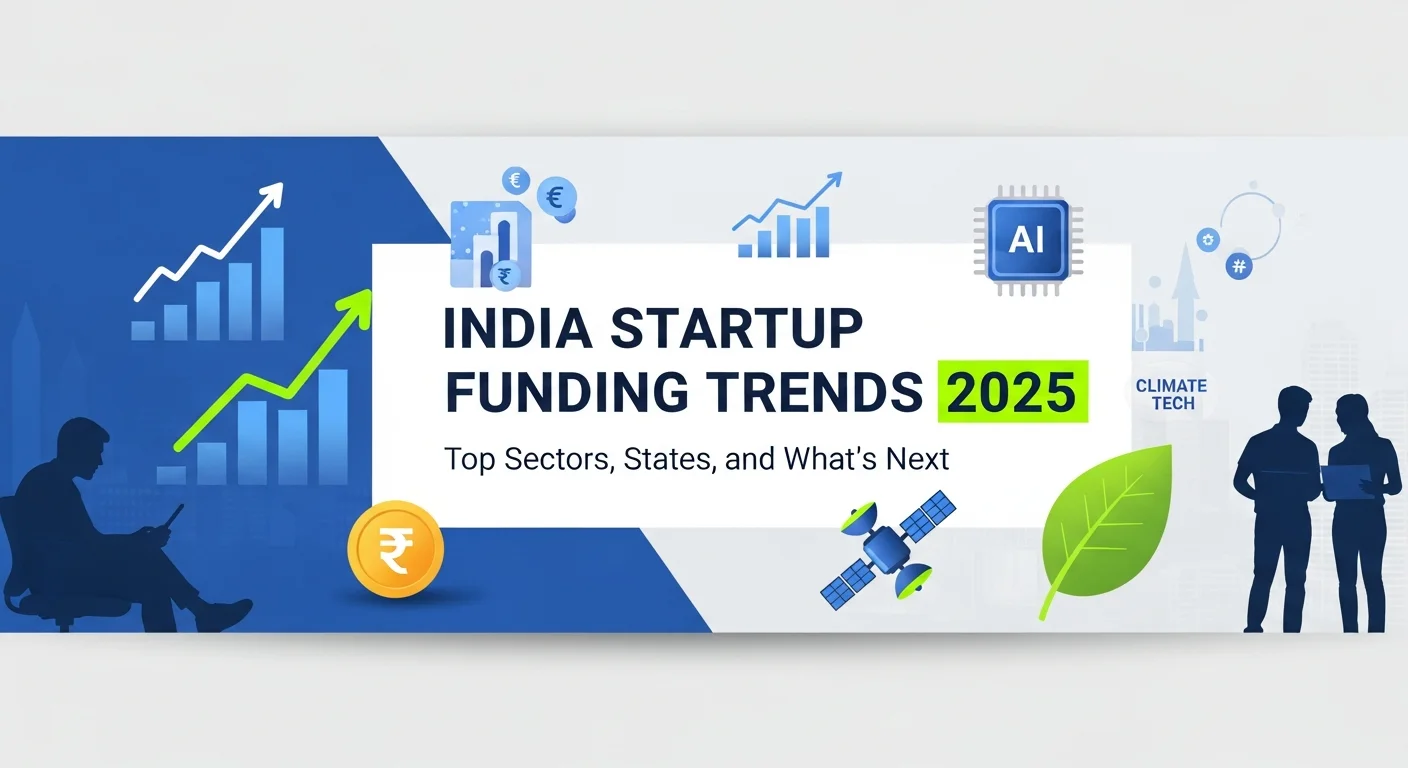India’s Startup Funding Landscape in 2025
India Startup Funding 2025 is expected to prove a crucial year for the ecosystem. India has now claimed the world’s third largest startup hub globally, even in the face of global uncertainty. There has been a 25% reduction in funding in lieu of the first half of 2024, but India can still lay claim to the second largest recipient of venture capital in Asia.In the first half of 2025, India’s startup funding landscape showed a clear shift toward maturity: growth-stage startups recorded an 18% year-on-year increase in total funding, while seed-stage capital declined by 31% year-on-year, according to the Inc42 H1 2025 Startup Funding Report.
A Shift Toward Quality Over Quantity
This shift in the funding landscape showcases investor preference towards a funding pattern in 2025 wherein investors are focusing on quality over quantity, reliability over hype. This shift highlights how investors are becoming more cautious, investing in proven business models that reflect operational efficiency and sustainable growth.
At the same time, funding is being directed towards strategic sectors like deep tech, AI infrastructure, semiconductors, space technology, biotechnology, and climate tech, which provide long-term and technological advantages rather than just short-term consumer trends.
India Startup Ecosystem Overview
India’s startup landscape has grown rapidly in terms of reach and scale. As of January 2025. Over 1.59 lakh startups have been recognized by DPIIT, up from just 500 in 2016. This massive growth highlights how entrepreneurship has not been confined to metros, but it has reached various districts, with startups now active across 770 districts.
The contribution of the startup ecosystem is not limited to innovation; it is a vital engine for job creation. These startups have generated more than 17.28 lakh direct jobs, majorly in IT services, healthcare, and fintech. While Government is backing its policies like Startup India and Digital India. India has established a startup network that now stands alongside the world’s most developed markets.
India Startup Funding TrendsTop Funded Sectors in H1 2025
In H1 2025, Indian startups received funding in various sectors. A few sectors emerged as clear winners in terms of funding, leading India’s startup comeback. The funding charts in H1 2025 were led by Fintech, e-commerce, and health tech, which together made up a substantial share of overall capital inflows.
Fintech Leads Funding Growth
According to the Startup Funding Trends 2025 Report, Fintech has emerged to be India’s most funded sector, securing $1.6 billion in H1 2025, a 56% jump year-on-year . The reason behind the growth is due to strong growth in Digital payments adoption, Embedded finance solutions, Wealth management platforms, Credit and lending innovations. Significant deals included Groww’s $200 million funding round and IKF Finance’s $172 million raise, showcasing investor confidence in scalable fintech models that generate revenue.
E-Commerce Rebounds Strongly
E-commerce made a significant return, raising $873 million across 81 deals in H1 2025, which marks a 53% increase in capital compared to H1 2024. This made e-commerce the second most funded sector after fintech. Investor enthusiasm was driven by the growth of social commerce, the expansion of B2B marketplaces, and deeper engagement in rural areas.
Health tech Continues Momentum
The healthcare sector continued to draw a healthy investor interest, with $828 million in the first half of 2025. The growth of this sector was driven by the rise of telemedicine, AI-based diagnostics, and the development of mental health and pharmaceutical technology platforms, which are contributing to the revolutionization of healthcare access and delivery in India.
Together, these sectors showcase India’s move towards technology service-driven business models combined with clear regulations with significant market potential, which tells that investors are looking for stability and scalability rather than speculative investments.
Sectors That Declined
In 2025, certain sectors achieved significant growth, while other sectors experienced correction as investor focused towards profitability and sustainable models. Funding in Edtech and SaaS fell rapidly in the first half of 2025, signaling a market departure from categories that are oversaturated.
After experiencing two years of unprecedented growth due to the pandemic, Edtech saw a drastic 40% year on year decline, receiving only US $150 million in H1 2025. Investors have stepped back as user growth normalizes and monetization issues continue to be a challenge. This slowdown suggests that education startups need to look for clear revenue strategies and should look for hybrid or B2B models to regain momentum.
The SaaS sector has also seen a slowdown, generating US $261 million even though despite its earlier impressive track record. With global IT service spending reduced and with heavy competition in established areas like CRM and marketing automation, have restrained. Future growth will depend on the integration of deep-tech and AI-driven solutions for enterprises. These fields are attracting strategic investments driven by technological progress, policy support, and a global demand for sustainable solutions.
Emerging Sectors Driving the Next Decade
As Traditional industries faced downturns, innovative sectors like artificial intelligence (AI), deep tech, and climate tech are leading India into its next era of innovation. These industries are attracting investors for long-term potential.With national goals, and their ability to generate economic value driven by technology.
Artificial Intelligence has become a major driving force for India’s fastest-growing startup segments. In 2024, funding in AI startup reached around $758 million, with a 39.9% year on year increase, wherein Generative AI taking a lead in this segments. India currently hosts over 240 Gen AI Startups, which is a 3.6x increase from the last year . Bengaluru continues to be the leader in AI capital of India, securing nearly 40% of the total funding for AI startups, with companies like Qure.ai and AGNEXT spearheading innovations in healthcare and Agri-tech.
India’s Deep Tech ecosystem is rapidly evolving, featuring over 3600 startups engaged in areas like quantum computing, semiconductors, biotechnology, and space technology. In 2023, alone 480 deep tech startups were founded, which is double compared to the previous year. Startups like Qnu Labs in quantum cryptography and various new space tech ventures are establishing India as a potential global innovation leader.
The Climate tech sector has also gained momentum in securing long-term capital in line with India’s Net Zero 2070 goals. The innovation in renewable energy, sustainable materials, and waste management by startups, which will help drive the green technology market, is anticipated to grow at a 32.9% CAGR between 2024 and 2030.AI, deep tech and climate deep tech, and climate tech foundation for the next decade of startups in India. These areas combine innovation, policy assistance, and global relevance, making them the new priority for investors seeking sustainable, future-oriented growth.
State Wise Funding Breakdown 2025
While new technologies are transforming India’s startup scenario, the allocation of funding across the nation is still heavily focused on Tier-1 cities. States such as Karnataka, Maharashtra, Delhi NCR, and Telangana are still attracting the majority of capital, even smaller ecosystems start to show potential. According to the Startup Funding Trends in India 2025 Report, these four states collectively received over 90 percent of the total funding, highlighting the ongoing regional disparity in India’s venture landscape.
Karnataka, with Bengaluru at the leading at top position with US $ 1.7 billion in H1 2025, despite a significant 44 percent decline from which is double compared to the previous year. Followed by Maharashtra, due to expanding fintech and consumer-tech presence in Mumbai with US $ 1.4 billion, marking an 8 percent increase. Delhi NCR managed to attract around US $ 0.9 billion, supported by favourable policies and a diverse range of startup activities, while Telangana continued its upward momentum with US $ 0.6 billion (+12 percent YoY), driven by initiatives such as the T-AIM (Telangana AI Mission).
Despite Tier-1 leading its position, Tier-2 and Tier-3 cities are beginning to show signs of early momentum. They represented less than 8% of the total funding in 2025, but cities like Jaipur, Ahmedabad, Indore, and Bhubaneswar are increasing their visibility through local incubators, state-led seed initiatives, and expanding digital infrastructure. As investor awareness increases and government backing continues, these cities may transform into the next growth frontier for India’s startup ecosystem.
(Source: Startup Funding Trends 2025 Report, Inc42 H1 2025 Funding Report)
Overall, the data shows that while Karnataka and Maharashtra continued to remain top position in India’s startup powerhouses, we are witnessing a gradual shift towards regional diversification. With the help of state government policies and decentralized innovation strategies, India is slowly progressing towards a more balanced startup ecosystem throughout the country.
Policy & Government Support Driving India’s Startup Momentum
The backing of policies has been essential of India’s startup journey, helping in from initial innovation to viable enterprises. In 2016, the Startup India initiative set the foundation for this change by making compliance easier, enhancing credit availability, and encouraging tax breaks for new enterprises. Further programs like Digital India and Make in India have helped in speeding up in digital adoption and encouraged tech-driven entrepreneurship across various fields. As of January 2025, DPIIT has recognized over 1.59 lakh startups, highlighting the scale of innovation supported by the government, according to the Startup Funding Trends in India 2025 Report.
Funding remains at the centre of the limelight for its supportive initiatives by the government. Startup India Seed Fund Scheme (SISFS) has helped over 2,600 startups through 213 incubators nationwide and has made a corpus of ₹945 crore. Alongside the Fund of Funds for Startups (FFS), which is controlled by SIDBI with a total size of 10,000 crore, continues to provide growth capital through SEBI registered Alternative Investment Funds (AIFs). Collectively, these schemes have enhanced India’s initial-stage financing pipeline and minimized the financial bridge between ideas and investments.
In addition to national Initiatives, state level policies are advancing decentralised innovation. The Production Linked Incentives (PLI) scheme which includes 14 sectors with an investment of ₹ 1.97 lakh crore promotes investment in manufacturing, deep-tech, and R&D. States like Maharashtra and Karnataka have established focused frameworks: the Maharashtra Startup Policy 2025 is designed to create 50,000 startups and 1.25 lakh entrepreneurs, while the Karnataka ELEVATE Program provides grants of up to ₹ 50 lakh for promising early-stage businesses.
The national and regional strategies showcase how public policy and private sector are aligning to shape the future of entrepreneurship in India over the next ten years. By improving access to capital and strengthening regional ecosystems, the government is creating a startup economy that is more inclusive, resilient, and equipped for the future.
Key Challenges Facing India’s Startup Ecosystem in 2025
In spite of supportive policies, frameworks, and robust funding momentum, India startup ecosystem saw various structural challenges that may influence its future trajectory. The most critical challenges are funding accessibility, regulatory complexity, scaling issues, and talent shortages.
Funding Access & Due Diligence Shift
Despite the availability of growth-stage capital, while early-stage startups are finding to get timely funding. According to the Startup Funding Trends 2025 Report suggest seed stage investment saw a 31% drop year on year, which points to cautious investors’ more stringent due diligence practices.
Regulatory complexity
The presence of various compliance layers and levels, along with the changing landscape of data protection, taxation, and fintech laws, increases operational expenses. For new startups, dealing with these frameworks impacts their resources for developing products and attracting customers. Streamlined, industry-focused policies could reduce these entry obstacles and promote wider involvement from Tier-2 and Tier-3 entrepreneurs.
Scaling and operational challenges
Research shows that mainly due to the problems in sustainable scaling, 90% of the startups fail within five years. The intensity of the market and the inability of the business to handle a large number of customers and the expensive nature of the customer acquisition process challenged the feasibility of the business. Startups should put the focus on sustainable growth rather than inflated growth numbers.
Talent retention and capability gaps
As funding cycles shift, startups face major challenges in retaining and attracting skilled talent. Due to intense competition for experienced professionals in product, data, and design roles, it becomes difficult for startups to find talented individuals with the right skills for their business. To establish a strong internal culture, equity-linked incentives, and continuous learning are now crucial for startups looking for growth and stability.
In summary, the Indian startup challenges in 2025 showcase highlight the urgent requirement for a more developed ecosystem. Tackling the early-stage funding and simplifying compliance, strengthen mentorship networks, and facilitating better access to talent are vital for ensuring that the next generation of entrepreneurs in India can grow sustainably and compete on a global front.
Future Outlook: What Lies Ahead for India’s Startups in 2025–26
India’s Startup ecosystem is heading into a stage of careful but impactful growth, influenced by a renewed commitment to profitability, innovation, and inclusivity across regions. Although there are temporary slowdowns, The Prospect for 2025–26 remains optimistic as investors, entrepreneurs, and policymakers focus more on sustainable business models and innovation in technology-led solutions.
According to the Startup Funding Trends in India 2025 Report, India’s total startup funding is expected to reach US $14–15 billion by the end of 2025, fueled by strong sectors such as fintech, AI, deep tech, and climate tech. Looking forward Startup ecosystem is anticipated to create new unicorns, but with a greater focus on unit economics, operational efficiency, and long-term value creation rather than just rapid scaling.
The upcoming growth can be shaped by the expansion of Tier-2 and Tier-3 regions, wherein focusing on developing infrastructure, digital inclusion, and state-level innovation policies will provide new opportunities. Cities like Ahmedabad, Jaipur, Indore, and Bhubaneswar are already demonstrating their potential, indicating a slow but steady decentralization of India’s innovation landscape.
For startups, the message is evident that the phase of “growth at all costs” is being replaced by a focus on sustainable performance. Founders must look after the operational efficiency, profitability, and technology adoption to maintain their competitive edge. While investors may focus on diversifying portfolios toward deep-tech, AI-driven, and sustainable enterprise or socially responsible startups that will lead to measurable impact. Policymakers are anticipated to enhance tax incentives, streamline compliance, and broaden seed-funding programs to promote inclusive innovation nationwide.
SIndian startups in 2025-26 might not just be running behind the valuation. but about building resilience, staying relevant,
and sustainable businesses. With an effective blend of innovation, supportive policies, and disciplined investors, the ecosystem is ready to define the next ten years of entrepreneurship in the worldwide economy,


